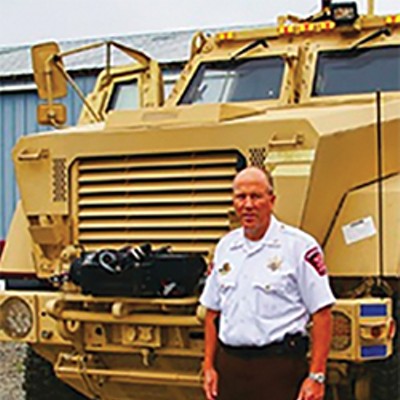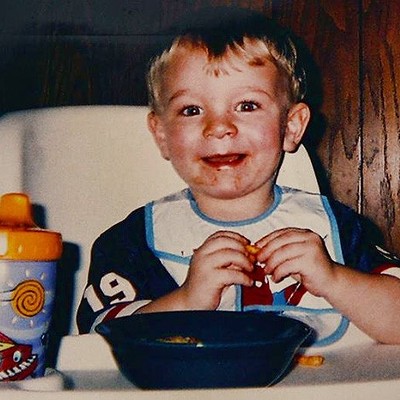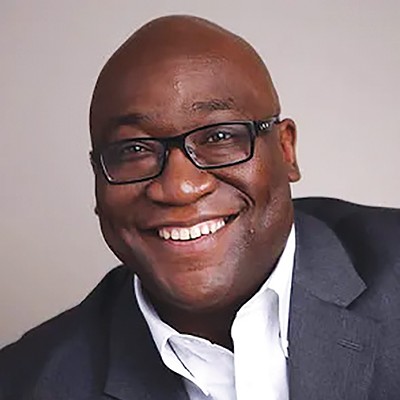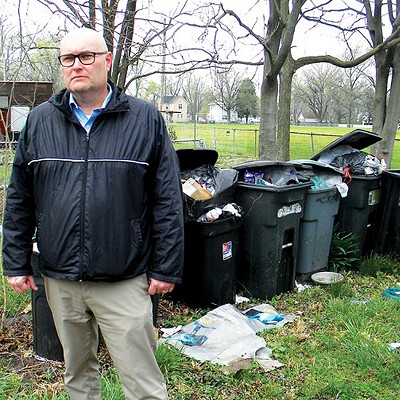Life’s too short to look like a homeless person. That’s why I shop at Goodwill.
Norwegian split-toe bluchers by Alden. Shell cordovan. Ben Silver button-downs, Brioni trousers and oxford cloth from Brooks Brothers. Spend enough time shopping at Goodwill and you can look better than the president, which these days isn’t saying much.
I didn’t know him until last week, but Nicholas Braun helped. They let him on the sales floor, occasionally, to put stuff back on hangers that shoppers hadn’t returned on their own. Mostly, he stayed in the backroom, finding mates for shoes amid heaped masses or pulling clothes from bins and hanging them on racks. Occasionally, he’d find a soiled diaper or discover a treasure – he says he once found $1,000 in a box that he turned over to a supervisor. Mostly, though, Nicholas plugged away, tossing anything stained into the do-not-sell pile, inspecting LPs for scratches and making sure that Barbra Streisand records weren’t in Madonna sleeves, or vice versa.
He loved his job – it’s the only one he’s had since graduating from high school. At 28, he lives with his mother near Divernon. For more than six years, Goodwill sent a van to pick Nicholas up each morning, and a van brought him home from work each afternoon. He earned $600 every month and called in sick twice.
It is, exactly, what Goodwill is supposed to do.
“Friends of Goodwill, be dissatisfied with your work until every handicapped and unfortunate person in your community has an opportunity to develop to his fullest usefulness and enjoy a maximum of abundant living,” Rev. Edgar Helms, the organization’s long-dead founder, once said.
Goodwill fired Nicholas, and more than a dozen coworkers, on July 1. Not enough money to pay you, the charity said in a June 14 letter that his mother says she received a week later. The last day was heavy. “We cried,” Nicholas recalls. “We were like family.” Some who lost their jobs, he says, live in group homes.
Nicholas isn’t like most people. For one thing, he turns on a zillion-watt grin in a nanosecond. For another, he was born premature and has been diagnosed with autism, Tourette Syndrome and a mild form of cerebral palsy. After high school, Nicholas studied at Lincoln Land Community College but wasn’t happy there.
Goodwill was different. There is something to getting paid for working at a job most folks wouldn’t want and earning enough to buy junk food and clothes, for which Nicholas acknowledges weak spots.
Nicholas, still, is welcome at Goodwill, except he doesn’t get paid, nor does he do anything useful. Instead of hanging clothes and sorting shoes, he’s gotten perfect scores on worksheets that ask the sum of five-plus-three, part of a program in which Nicholas is supposed to learn life skills but which he finds too easy. Every morning, a van will still pick him up and deliver him back home in afternoons, but Nicholas says that he’s stopped taking the short bus. He wants a job.
Sharon Durbin, president and chief executive officer of Land of Lincoln Goodwill Industries, says Nicholas and others were let go because Goodwill, faced with increases in the state’s minimum wage scheduled to start next year, can’t afford to pay them. “If anyone has a complaint about the changes we’re making, reach out to your legislators,” Durbin says. “The business model that Goodwill has had for many years isn’t going to work as we go forward.” She also says that Nicholas and his coworkers weren’t terrific, that others had to re-do their tasks and that Goodwill kept them on the payroll nonetheless. She talks about the future: If folks like Nicholas earn too much now, the feds might reduce benefits in later years.
These sound like excuses. Land of Lincoln Goodwill Industries has a history that invites one to wonder whether the agency has forgotten why it exists. Durbin’s predecessor resigned in 2005 after prosecutors gave him a choice: Quit or go on trial for Medicaid fraud. He was accused of falsifying documents to collect money that the charity didn’t deserve. Stores were staffed with temporary workers instead of employees. Finances were precarious. And the board of directors, which included judges, the county sheriff and other civic leaders, was oblivious. All they saw was paperwork that was just so much paper, showing that sales were steaming along when, in fact, the charity was amok.
Durbin has been credited with turning things around, and she’s been rewarded. She started out at $85,000 a year in 2006 and now makes $165,000. She’s hired her son to oversee retail operations – he’s paid more than $95,000 while Nicholas never got a raise. Goodwill last week opened a Clinton store at a former Walmart. Given what’s happened to Nicholas, it’s fair to ask whether Goodwill has morphed into a chain of big-box stores that doesn’t pay taxes as opposed to a charity that has the disadvantaged as its primary concern.
I’m hearing, as I write this, that Goodwill might rehire Nicholas and others. In any event, Nicholas, thanks for the shoes. I appreciate it.
Contact Bruce Rushton at [email protected].





















